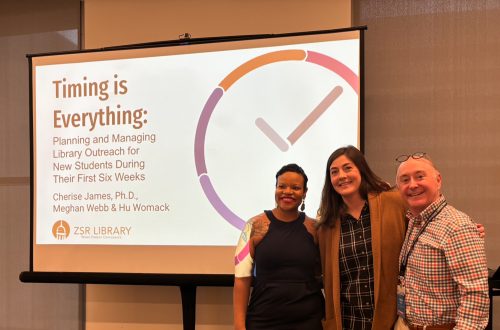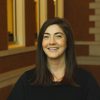Recently, we had the opportunity to attend and present “Timing is Everything: Planning and Managing Library Outreach for New Students During Their First Six Weeks” at the First-Year Experience Conference 2024 in Seattle with the Director of Orientation, New Student and Transitions Programs, Dr. Cherise James. This was the largest FYE since COVID-19 and the third largest in the organization’s history, with over 2000 attendees and over 100 vendors. Here are some highlights from the conference from Hu and Meghan.

Hu’s Highlights
I last attended the FYE conference in February 2020. The National Resource Center for The First-Year Experience and Students in Transition at the University of South Carolina has a 50-year history of developing curriculum for first-year experience classes and has offered this conference for 43 years.
Recommendations for effective first-year seminars based on fifty years of practice
One of my highlights from the conference was hearing John N. Gardner from the Gardner Institute for Excellence in Undergraduate Education and Dan Friedman from the University of South Carolina discuss recommendations for effective first-year seminars based on fifty years of practice! There was a great deal of discussion about the Gallup Big Six College Experiences, which have been around for a decade and still seem to be powerful indicators of student success.
Support experiences
- My professors at [university] care about me as a person.
- I have at least one professor at [university] who makes me excited about learning.
- I have a mentor at [university] who encourages me to pursue my goals and dreams.
Experiential learning
- While attending [university] have you had an internship or job that allows you to apply what you’re learning in the classroom? (answered as yes/no)
- While attending [university] I worked on a project that took a semester or more to complete.
- I am extremely active in extracurricular activities and organizations.
Other interesting facts about their program included that they rebuild the course every five years, that they get input from students every year, and that the latest retention number 6% higher for participants in the course than non-participants and much higher for specific cohorts within the larger group.
Keynote Speaker – Dr. Brendan Kelly, President at the University of West Georgia
Dr. Kelly took over as president on March 23rd 2020, to an empty campus, followed by the largest budget cut in school history later that year. He described the need to know what experiences are transformative for our students if we want to future proof higher education. Like other presentations at FYE, he referenced the Gallup-Purde “Big Six” discussed above. He discussed our different the world is and our students are post-covid, how optimism is a choice and that it’s key to progress that we believe tomorrow will be better than yesterday. He also talked about the importance of belonging as an essential part of college, and how it looks different now than it did in the 1990s and institutions need to recognize and acknowledge that.
Plenary Speaker – Jessica Rowland Williams – “Working and Why in First-Year Success
Dr. Jessica Rowland Willimas, the Senior Director of Client Service Delivery of the National Institute for Student Success (NISS), at Georgia State University, explored the challenges and opportunities of the current climate and shared practical strategies that have proven to be transformative in first-year experiences. She described innovative approaches to elevate student engagement, build resilience, and foster a nurturing community. One example was the creation of “Meta Majors”. Meta majors allowed students to pick a broad area to major in to decrease the large number of major changes students were experiencing and help ensure the courses they were taking would ultimately count towards their major. This program resulted in a 32% drop in changes to major. Dr. Williams also discussed how institutions can both hinder and help students and how being an agent of change can be a challenging and exhausting process while also being rewarding and beneficial to students! Dr. Williams encouraged us all to keep asking hard questions, focus on what we can change, and to design systems for students at the margins, noting that such systems usually have a positive impact on all students. Lastly, she encouraged us all to remember to take care of ourselves as we did this work, noting that burnout is an ever-present issue!
Meghan’s Highlights
I last attended the FYE Conference in 2017 in Atlanta, so I was happy to return and thrilled to present at this year’s conference. It was wonderful to hear about experiences, concerns, and accomplishments related to first-year students from higher ed professionals across campus departments. I observed more librarians at the conference this year than my conference experience in 2017. Additionally, it was great to spend time with our partners from the WFU Orientation, New Student, and Transition Programs (Cherise James, Phillip Wogatzke, and Gianna Medina), who also attended this year’s FYE Conference.
The Pandemic’s Impact on Research Skills: A Survey Data Comparison
In our post-pandemic world, I’ve had a handful of conversations with fellow instruction librarians around the stark differences we’ve noticed between pre and post-Covid LIB students (mostly around their pre-course research experiences, their confidence with locating and evaluating sources, their levels of engagement in the classroom, etc.) So, I was very interested in learning more around the pre and post-survey data presented at this session. Four librarians from Davidson College (Cara Evanson, Holly White, Sydney Adams, and Jayme Sponsel) shared survey data that assessed information literacy competencies from both pre (2014) and post-Covid (2023) first-year students at their institution. There were some interesting differences between the 2014 and 2023 cohorts related to identifying sources. The 2023 group had more difficulty categorizing and identifying various formats, with the exception of identifying websites and journal articles. 2023 students from the survey demonstrated less confidence for when and how to use sources, and a slightly greater acceptance of plagiarism (comfort in using sources without citing) than the pre-pandemic cohort. There were also some interesting differences in student attitudes related to research and information evaluation. The Davidson librarians have not yet done any statistical analysis of their findings, but perhaps there will be a publication in the future!
Ikigai: Helping Students Discover and Explore their Life Purpose
Brad Garner, Director of Faculty Enrichment in the Center for Learning and Innovation at Indiana Wesleyan University, gave a robust and engaging presentation around Ikigai, which is the Japanese concept of discovering your purpose through exploring the intersection of what you love, what you’re good at, what the world needs, and what you can be paid for (translated to mean “the thing you live for”). Garner arranged his presentation as both an overview of this concept (and discussion around applications for first year and undergraduate students) AND a guided demonstration for session attendees. I was really impressed with how this session was organized and kept thinking that this would be a wonderful activity for engaging students/advisees in reflection and conversation around their passions and potential directions for vocations and professional interests.
Book Clubs for Student Engagement
Y’all know I love a book club. But I’ve found that it can be tricky to find the right approach for organizing and hosting a successful (well-attended) student-centered book club on campus. At this session, Kimberly Larson (Librarian) and Ashton Payne (student) from the University of Arkansas shared reflections and best practices from their student book club- the Razorbook Club. Their student book club is part of the University of Arkansas’ “Pick One” program– an initiative for First Year students to engage with a number of special-interest campus programs and events. First year students are not “required”, but highly encouraged to participate in this program. I really liked this “pick one” program model– it reminded me of our pre-orientation offerings, but I like that this extends throughout the first semester for new students on campus. Through the support of this broader “Pick One” initiative, the Razorbook Club had 87 first year students sign up for their book club! Not all of the students who signed up stuck with the program, but it was really uplifting to learn about this broad interest.
Here are some of the best practices and big ideas that I gleaned from this presentation:
- MAKE IT FUN! The conversation at the meetings may not revolve around the selected book, and that’s okay! It’s more about the community and giving students a space to socialize and feel a sense of belonging.
- Have students suggest titles for the book club and let them select (by majority vote) on what book to read.
- Consider using an alternative to email for group communications (signals get lost in the noise of the email inbox).
- Have students create promotional / marketing content and lead efforts to recruit other students (students are more attune to how to sell the program to other students)
- Consider tangential/related activities and outings that you can offer your book club members, such as book crafts, group outings to independent bookstores, author talks, etc.


5 Comments on ‘Meghan and Hu at the 43rd Annual First-Year Experience Conference in Seattle’
What a packed conference! Thanks for sharing the insights you gained. I want to hear more about your session with Cherise, too! Timing IS everything.
Thank you for sharing, Meghan and Hu. I loved the Ikigai presentation; It contains important information that is relevant to something I am currently working on!!!!
Always enjoy hearing about FYE, it sounds very dynamic and relatable to your work. And love that you were able to be there with folks from Orientation, New Student, and Transition Programs too!
Sounds like a great conference! Hu, the idea of meta majors is intriguing. I could see Wake exploring this idea given how many students double major/minor here – clearly our students have broad interests that could be unified under a meta major. Meghan, I’m excited for the book club ideas you picked up!
Ikigai! I needed someone to talk to me about that when I was in college!